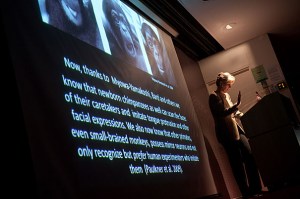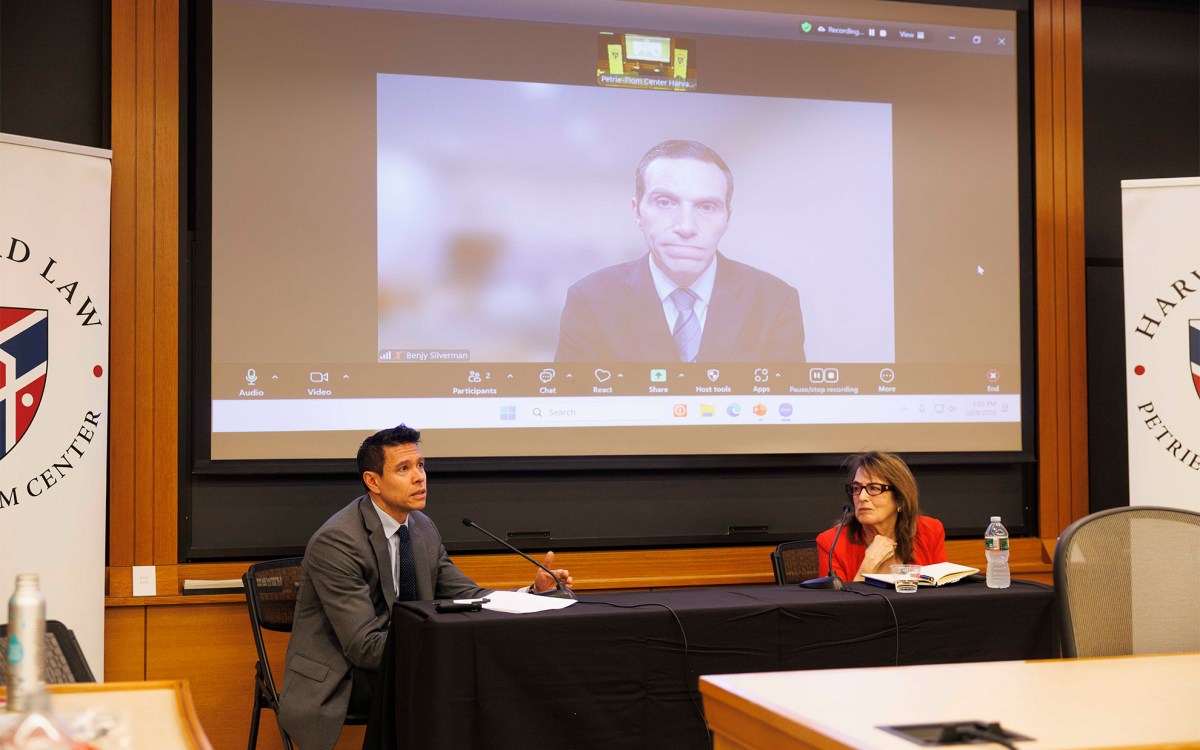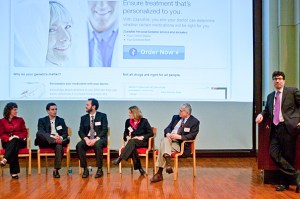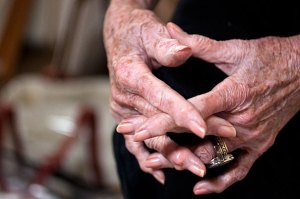Tag: DNA
-
Science & Tech
A new view of DNA
A new imaging technique, developed by Erez Lieberman-Aiden, a Junior Fellow of the Society of Fellows, is giving scientists their first three-dimensional view of the human genome, one that is already shedding new light on a number of what Liberman-Aiden calls the “central mysteries of biology.”

-
Health
Genetic mechanics
As reported in the online version of Nature Structural & Molecular Biology on Feb. 5, researchers have produced 3-D images of the protein system that works to repair DNA. The images reveal that the proteins can actually alter their shape in what amounts to a genetic “pat-down,” or a way for the mechanism to identify…
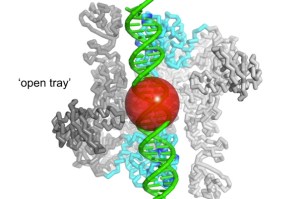
-
Health
Sending DNA robot to do the job
Researchers at the Wyss Institute for Biologically Inspired Engineering at Harvard University have developed a robotic device made from DNA that could potentially seek out specific cell targets within a complex mixture of cell types and deliver important molecular instructions, such as telling cancer cells to self-destruct or programming immune responses.
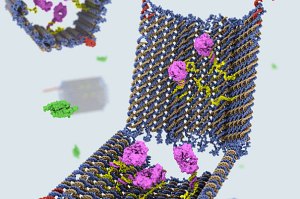
-
Health
The search for life’s stirrings
As science wrestles with the problem of how life arose on Earth, hindsight shows that seemingly intractable obstacles can have simple, even elegant solutions, said Nobel laureate Jack Szostak.
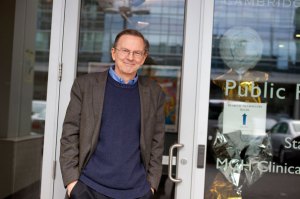
-
Health
Following the clues
Researchers at Harvard Medical School and Children’s Hospital Boston have retraced the evolution of an unusual bacterial infection as it spread among cystic fibrosis patients by sequencing scores of samples collected during the outbreak, since contained.
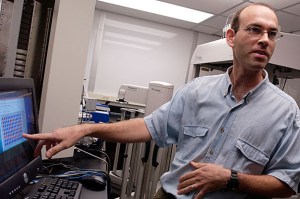
-
Health
Cancer clues from another species
Researchers have decoded the genome of an unlikely ally in the fight against cancer and aging, the naked mole rat, to find clues on why it resists the disease and lives 10 times as long as ordinary mice.

-
Health
Colon cancer connection
Scientists at Harvard-afilliated Dana-Farber Cancer Institute and the Broad Institute have found strikingly high levels of a bacterium in colorectal cancers, a sign that it might contribute to the disease and potentially be a key to diagnosing, preventing, and treating it.
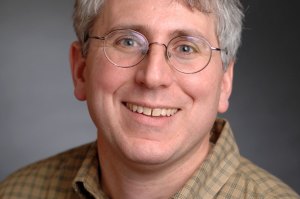
-
Health
Major study on schizophrenia, bipolar
Looking at large samples, an international consortium — that included involvement by scientists at the Broad Institute of Harvard and MIT and Harvard-affiliated Massachusetts General Hospital (MGH) — has identified 10 genetic risk factors that contribute to either schizophrenia or bipolar disorder and discovered strong evidence for three genes being implicated in both diseases.
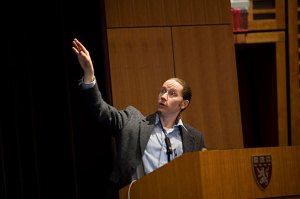
-
Science & Tech
Following path of genetic footprint
An international team of researchers studying DNA patterns from modern and archaic humans has found that the Denisovans, a recently discovered hominin group, contributed genes to several populations in Asia and that modern humans settled Asia in more than one migration.
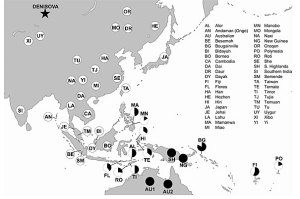
-
Health
Disrupting a cancer gene
Scientists at Harvard-affiliated Dana-Farber Cancer Institute have successfully disrupted the function of a cancer gene involved in the formation of most human tumors by tampering with the gene’s “on” switch and growth signals, rather than targeting the gene itself.
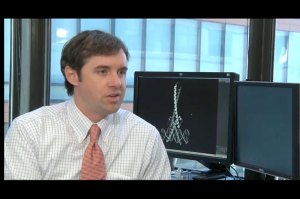
-
Health
New territory
A consortium led by scientists at the University of Oxford and Harvard Medical School has constructed the world’s most detailed genetic map, built from data from 30,000 African-Americans. The researchers assert that this is the most accurate and highest resolution genetic map yet.

-
Science & Tech
Finding the genetic trail
Harvard Medical School researchers have traced the influence of genes from sub-Saharan Africa in European, Middle Eastern, and Jewish populations, quantifying the intermingling that occurred over many generations.
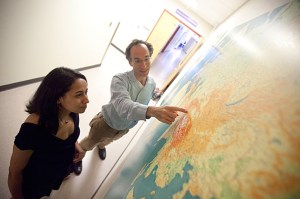
-
Campus & Community
Not black and white
During a trip to the Museum of Science, Harvard College Dean Evelynn M. Hammonds and students from her freshman seminar revisited many of the issues they explored in her fall class.

-
Health
RNA dynamics deconstructed
RNA plays a critical role in directing the creation of proteins, but there is more to the life of an RNA molecule than simply carrying DNA’s message.
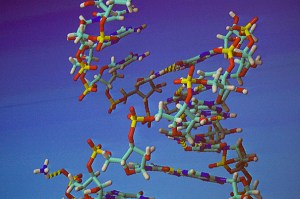
-
Health
Multiple myeloma genome unveiled
Harvard scientists have unveiled the most comprehensive picture to date of the full genetic blueprint of multiple myeloma, a form of blood cancer.
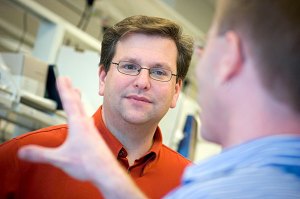
-
Health
Beyond DNA
On a day when Harvard celebrated the accomplishments of the Human Genome Project, the Radcliffe Institute hosted a scientist whose work focuses not just on DNA, but on the mechanisms that control its expression.

-
Health
Following the genomic road map
Harvard President Drew Faust hosted a panel discussion on the legacy of the Human Genome Project Feb. 22 at Sanders Theatre.

-
Science & Tech
The map of us
To mark the 10th anniversary of the publication of the Human Genome Map, Harvard President Drew Faust will host a panel discussion on the project next week (Feb. 22) in Sanders Theatre.

-
Health
Seeing double
By comparing the DNA of modern elephants from Africa and Asia to DNA extracted from two extinct species, the woolly mammoth and the mastodon, researchers have concluded that Africa has two — not one — species of elephant. Now that we know the forest and savanna elephants are two very different animals, the forest elephant…
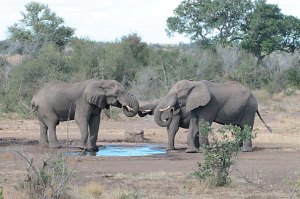
-
Health
Partial reversal of aging achieved in mice
Harvard scientists at Dana-Farber Cancer Institute say they have for the first time partially reversed age-related degeneration in mice, resulting in new growth of the brain and testes, improved fertility, and the return of a lost cognitive function.
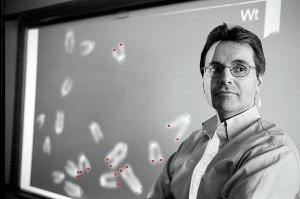
-
Health
‘Another set of fingers’
An interdisciplinary group of leading Harvard geneticists and stem cell researchers has found a new genetic aspect of cell reprogramming that may ultimately help in the fine-tuning of induced pluripotent stem cells (iPS) into specific cell types.
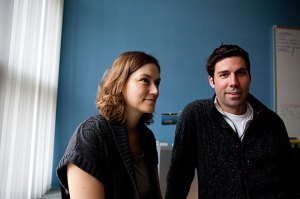
-
Health
A man of endless curiosity
Emre Basar seeks to understand how small interfering RNA (siRNA) can be harnessed and integrated into cells with the goal of silencing the expression of certain proteins that allow diseases like breast cancer and HIV to proliferate inside the body.
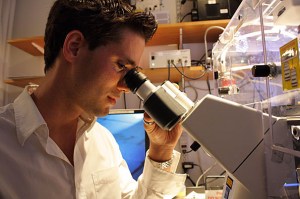
-
Science & Tech
Computer imaging that aids science
Miriah Myer, a postdoctoral fellow, is a computer scientist using technology to better model and clarify medical data.

-
Health
Nobel winners and losers
Author Erling Norrby discusses how the Nobel Prizes for the sciences, while often awarding breakthrough efforts, also can miss pivotal findings that made a difference.
-
Health
Tracking our traits
Researchers devise method to pinpoint key genetic variations under positive natural selection that may impact human health.

-
Health
The deciding factor
What, exactly, distinguishes humans from apes? It’s certainly more than just our genes, renowned anthropologist Sarah Blaffer Hrdy. Hrdy, who received her A.B. in 1969 and Ph.D. in 1975 for work in Harvard’s Department of Anthropology, returned to speak on “Mothers and Others: The Origin of Emotionally Modern Humans.”
